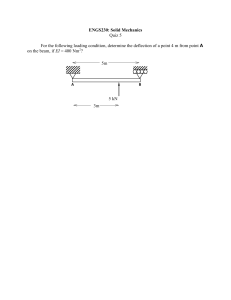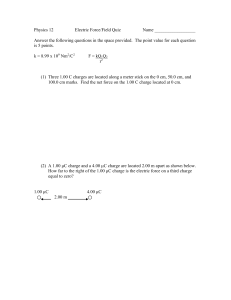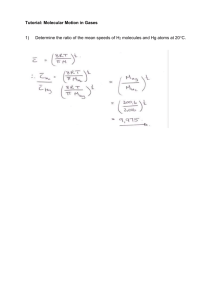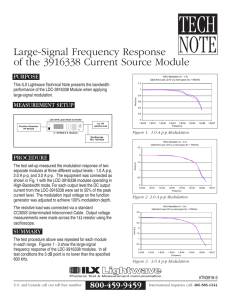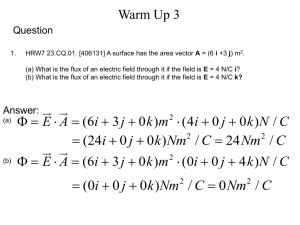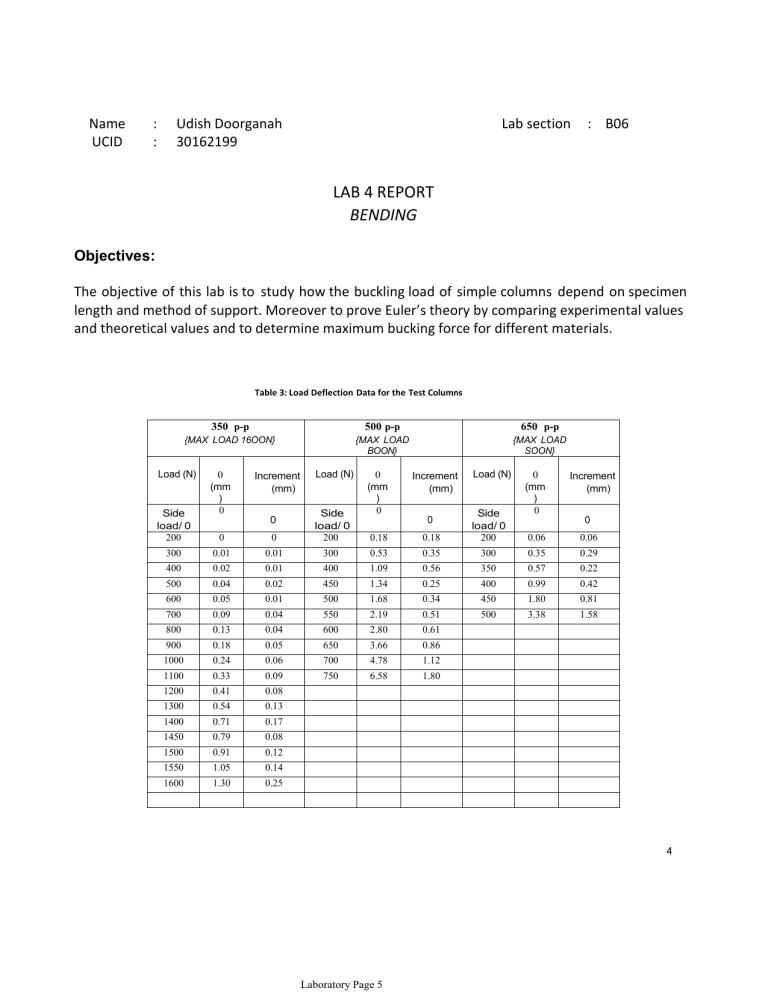
Name
UCID
:
:
Udish Doorganah
30162199
Lab section
: B06
LAB 4 REPORT
BENDING
Objectives:
The objective of this lab is to study how the buckling load of simple columns depend on specimen
length and method of support. Moreover to prove Euler’s theory by comparing experimental values
and theoretical values and to determine maximum bucking force for different materials.
Table 3: Load Deflection Data for the Test Columns
350 p-p
500 p-p
650 p-p
{MAX LOAD 16OON}
{MAX LOAD
BOON}
{MAX LOAD
SOON}
Load (N)
Side
load/ 0
200
0
(mm
)
0
Increment
(mm)
Load (N)
0
0
Side
load/ 0
200
300
400
0.01
0.02
0.01
0.01
500
0.04
600
0.05
700
800
0
(mm
)
0
Increment
(mm)
Load (N)
0.18
0.18
Side
load/ 0
200
300
400
0.53
1.09
0.35
0.56
0.02
450
1.34
0.01
500
1.68
0.09
0.13
0.04
0.04
550
600
0
0
0
(mm
)
0
Increment
(mm)
0
0.06
0.06
300
350
0.35
0.57
0.29
0.22
0.25
400
0.99
0.42
0.34
450
1.80
0.81
2.19
2.80
0.51
0.61
500
3.38
1.58
900
0.18
0.05
650
3.66
0.86
1000
0.24
0.06
700
4.78
1.12
1100
0.33
0.09
750
6.58
1.80
1200
1300
0.41
0.54
0.08
0.13
1400
1450
0.71
0.79
0.17
0.08
1500
1550
0.91
1.05
0.12
0.14
1600
1.30
0.25
4
Laboratory Page 5
650 f-p
{MAX LOAD 1000N}
650 f-f
{MAX LOAD 1800N}
Table 3 Continued:
200
0.18
0.18
Load (N)
Side load/
O
200
300
0.39
0.21
400
0.72
0.33
500
1.21
600
1.74
650
700
Load (N)
Side load/ O
o(mm)
0
Increment (mm)
0
o(mm)
0
Increment (mm)
0
0.05
0.05
300
0.13
0.08
400
0.23
0.10
0.49
500
0.39
0.16
0.53
600
0.52
0.13
2.35
0.61
700
0.71
0.19
2.78
0.43
800
1.0
0.29
750
3.59
0.81
900
1.27
0.27
800
4.73
1.14
1000
1.59
0.32
850
6.09
1.36
1100
2.04
0.45
900
9.38
3.29
1200
2.52
0.48
1300
3.45
0.93
1350
4.04
0.59
1400
4.56
0.52
1450
4.98
0.42
1500
5.67
0.69
1550
6.41
0.74
1600
7.69
1.28
ANALYSIS OF RESULTS
4
Laboratory Page 5
The red point on the graph identify the point at which the relationship becomes clearly
nonlinear as the experimental critical buckling load
Column Identifier
cross-sectional area
of the columns(m^2)
critical buckling load
critical buckling divided by the crosssectional area of the
load(L)
columns
350 p-p
8E-5
1600N
20E6
500 p-p
8E-5
800N
10E6
650 p-p
8E-5
5OON
6.25E6
650 f-p
8E-5
1000N
12.5E6
650 f-f
8E-5
1800N
22.5E6
4
Laboratory Page 5
Sample Calculation for 350 p-p at l=800N
Where:
𝑃𝑐𝑟 = 𝜋 2 (210𝑥109 )((0.02𝑋(0.004^3))/12)/(0.352 )
Pcr =1804 N
Column identifier
Pcr(N)( Experimental)
critical buckling load(L)(given) Percentage difference%
350 p-p
1804
1600
12.75
500 p-p
884
800
10.5
650 p-p
523
500
4.60
650 f-p
1068
1000
6.80
650 f-f
2093
1800
16.27
As percentage difference for all Columns is less than 20 percent
the values are valid.
Errors
there was systematic error in the experiment for the fixed-fixed
pin. The clamping restraint did not tighten completely as some of
thread had been stripped due to wear.This prevented the strut
from being held securely and may have given it some lateral
freedom, possibly accounting for the experimental buckling load
being so far below from the theoretical.
Other systematic error included the precision of the magnetic
ruler, which measured to the nearest millimetre. This gives an
uncertainty of ‡0.5mm in the readings..
The measurements from the magnetic ruler also had to be read by
eye and, of course there may have been some error in this reading
Laboratory Page 5
4
4
Laboratory Page 5
